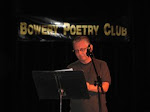Şanlıurfa, which everyone just calls Urfa, is a city in southeastern Turkey near the Syrian border. It boasts an 11,000 year history. Over the centuries, several cultures have called the city and surrounding area home; it's currently made up largely of Kurdish and Turkmen inhabitants. The city and the area are famous throughout Turkey for having the one of the richest musical cultures in the country. (One of Turkey's biggest superstars, Ibrahim Tatlises, was born there.)
The three singers included in this double-CD set--Hamza Senses (aka Kel Hamza, or Bald Hamza), Tahir Oturan (aka Mukim Tahir), and Bakır Yurtsever (aka Bekçi Bakır)--all hail from Urfa and each began recording in the late 20s.
Listen to Kel Hamza sing "Kışlalar Doldu Bugün"
Born in 1904, Hamza Sensis was an entirely self-taught poet and musician, never having attended school. His voice, as you can readily hear in that sample above, was astounding in its passionate expressivity. While working as a feltmaker, his coworkers overheard him singing to himself, and suggested he put out a record. After clearing the idea with his family--becoming a professional singer or musician, as opposed to just singing and playing for the joy of it, was considered shameful at the time in Urfa--he recorded his first record, which quickly turned into his first hit. He began getting offers to perform, in Urfa and beyond.
His life was difficult, marked by tragedy (including the death of his daughter), and short; he died, according to the booklet that comes with this CD, in 1939 (although this booklet also has him performing in the 40s), after getting into an argument with patrons at one of the clubs he often sang at. He had gone there on his day off and, as no one had been scheduled to perform that evening, a group of men asked him if he wouldn't mind singing. He got up on stage and performed a single song, then went back to his table and continued drinking. The other patrons began to insinuate he was acting stuck up; a scuffle ensued; Kel Hamza was pushed and fell a flight down into the bazaar below, striking his head against a woodblock in front of a carpenter's house.
Listen to Mukim Tahir sing "Yaram Sızlar"
While Mukim Tahir lived a few years longer than Kel Hamza, his life was no less tragic: he spent 10 years in prison, having been accused of murdering his uncle; while he was in prison, his wife died of tuberculosis; after being released from prison he became an alcoholic for many years, spending everything he had saved. He died in 1946 in his mid-40s. He is still remembered today as one of the all-time great Urfali singers.
Listen to Bekçi Bakır sing "Muradı Böyle"
And, finally, we have Bekçi Bakır (Bakır the Watchman), who in stark contrast with the other two singers in this collection, and despite being illiterate, enjoyed a long and healthy life, raising 10 children, recording dozens of records and hundreds of songs on tape before passing away in 1985 at the age of 78. His voice was reputedly so strong, he broke microphones when singing in Istanbul and developed a habit, after that, of either singing without one, or turning in the opposite direction if one was put onstage for him.
So? Get the 2-disc set here.



























.jpg)






















































.jpg)



































1 comment:
Doug Young left this comment, but I accidentally clicked on "Reject" instead of "Publish," so here it is, cut and pasted from my email. (Sorry, Doug! & link's been fixed):
Thanks for this. I didn't know about Urfa's musical tradition. With the world's earliest stone structures (about 10,000 BC - it's rewriting the history of human civilisation) then having such a strong musical tradition.... coincidence? Well, probably, but it's fun to think not.
Your link is leads to divshare 'File not found'.
Post a Comment